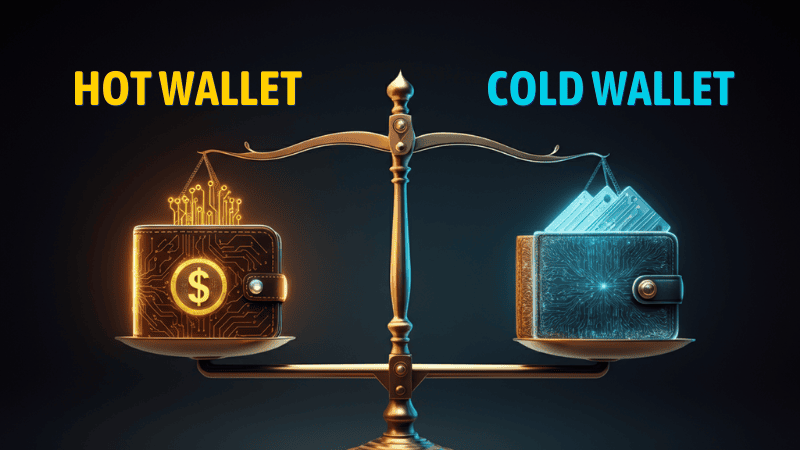Table of contents
- 1 What is a Crypto Wallet? A Complete Guide
- 1.1 What is a Crypto Wallet?
- 1.2 Types of Crypto Wallets: Finding the Right Fit for You
- 1.3 How to Choose a Crypto Wallet: A Step-by-Step Guide
- 1.4 How to Store Cryptocurrency Securely: Protecting Your Assets
- 1.5 Understanding Private Keys
- 1.6 How to Use a Crypto Wallet: The Basics
- 1.7 How to Set Up a Cryptocurrency Wallet: A Practical Guide
- 1.8 How to Backup Your Crypto Wallet: Protecting Against Data Loss
- 1.9 Wallet for Storing Multiple Cryptocurrencies: Versatility in Crypto Management
- 1.10 Frequently Asked Questions (FAQ)
- 1.11 Conclusion: Mastering the Art of Crypto Wallet Management
What is a Crypto Wallet? A Complete Guide
The world of cryptocurrency can seem like a complex labyrinth to newcomers, and even seasoned enthusiasts can sometimes feel overwhelmed by the sheer volume of information. But, at the heart of it all lies a single, indispensable tool: the crypto wallet. Far from being a simple storage space, a crypto wallet is your gateway to the decentralized world, a means to control your digital assets, and your key to navigating the exciting, but sometimes treacherous, world of digital finance.
This guide is designed to be your trusted companion in the quest to understand everything about crypto wallets, from the very basics to advanced security protocols. Let’s dive deep.
What is a Crypto Wallet?
At its core, a crypto wallet is a tool that allows you to interact with a blockchain network. It doesn’t technically store your cryptocurrencies but rather holds the private keys that grant you access to your funds on the blockchain. Think of it as a digital keychain that allows you to sign transactions. To truly grasp the concept, we need to understand a few key elements:
- Public Key: This is like your bank account number – it’s what you share with others so they can send you cryptocurrency.
- Private Key: This is the secret code, like your bank PIN or password, that lets you access and control your funds. Anyone with access to your private key can move your funds, hence the paramount importance of keeping them secure.
- Wallet Address: This is a derived identifier from your public key. This is the destination for transactions and what is often provided for people to send crypto.
Types of Crypto Wallets: Finding the Right Fit for You
Understanding the different types of crypto wallets is crucial to making the right choice for your needs. Each type has its own set of features, security trade-offs, and user experience. Let’s explore the various types of crypto wallets:
Hot Wallets vs. Cold Wallets: The Balancing Act
The first major distinction you’ll encounter is the difference between hot wallets and cold wallets:
Hot Wallets
- Definition: These are wallets that are connected to the internet. They are often more convenient for frequent trading and everyday transactions.
- Examples: Mobile wallets, desktop wallets, web wallets, and exchange wallets.
- Pros: User-friendly, easily accessible, and often free.
- Cons: More vulnerable to hacking attempts, phishing scams, and malware as they are constantly online.
Cold Wallets
- Definition: These wallets are offline and not connected to the internet. They are considered the most secure option for long-term storage.
- Examples: Hardware wallets and paper wallets.
- Pros: Extremely resistant to online hacking and theft.
- Cons: Less convenient for frequent transactions. Can be more costly.
Software Crypto Wallets: Accessibility and Flexibility
Software crypto wallets are applications that can be installed on your computer or mobile device. They are typically hot wallets.
Desktop Wallets
- How they work: These are software programs that are installed on your computer.
- Pros: Provide more control and security than web wallets.
- Cons: Vulnerable if your computer is compromised.
Mobile Crypto Wallets
- How they work: These are applications you install on your smartphone.
- Pros: Convenient and easy to use for daily transactions.
- Cons: Vulnerable to mobile malware and physical theft of your device.
Web Wallets (Online Wallets)
- How they work: These are accessed through your web browser, often hosted by cryptocurrency exchanges.
- Pros: Convenient for frequent traders.
- Cons: The least secure option, as you are trusting a third party with control over your funds.
Hardware Crypto Wallets: The Gold Standard in Security
Hardware crypto wallets are physical devices that store your private keys offline. They are considered the most secure option for holding larger amounts of cryptocurrency. They typically look like USB drives.
- How they work: They hold your private keys in a secure, offline environment. They are typically paired with an application on your computer that allows you to sign transactions.
- Pros: Very secure against online attacks.
- Cons: Can be more expensive and less convenient for daily transactions.
Other Types of Wallets
- Paper Wallets: These are generated by taking your public and private key offline and printing them, or writing them down. These are not very common due to their usability challenges.
- DeFi Wallets: These wallets specifically integrate with Decentralized Finance (DeFi) applications. They often allow users to connect directly to dApps and manage their DeFi investments.
How to Choose a Crypto Wallet: A Step-by-Step Guide
Selecting the right wallet is a crucial step in your crypto journey. Here’s a practical guide on how to choose a crypto wallet that meets your individual needs:
- Assess your needs: How often do you plan to make transactions? Are you looking to store cryptocurrency for the long-term or actively trade? How much are you looking to invest? This will impact your choices.
- Consider security: If you’re dealing with large sums of crypto, prioritize security. Hardware wallets are usually the best option for enhanced protection.
- Research wallet features: Does the wallet support the specific cryptocurrencies you want to hold? Does it offer features like multi-signature transactions or integration with hardware wallets?
- Ease of use: Some wallets are more user-friendly than others, especially for beginners. If you’re new to crypto, consider looking for wallets with an intuitive interface.
- Read reviews: Look for user reviews and ratings before settling on a particular wallet. Don’t rely on the app stores alone.
Best Crypto Wallets for Beginners
For beginners, a user-friendly interface is essential. Here are a few recommendations for the best crypto wallets for beginners:
- Exodus: Known for its beautiful and intuitive interface, multi-currency support, and integrated exchange feature.
- Trust Wallet: A mobile wallet with strong support for Ethereum and ERC-20 tokens. It also supports staking and integration with decentralized applications.
- Coinomi: A multi-currency wallet with a good reputation for security and a user-friendly interface.
Best Wallet for Bitcoin
While many wallets support Bitcoin, some are specifically tailored for it. Here are a few top choices for a best wallet for Bitcoin:
- Ledger Nano S/X: One of the most popular hardware wallets that offers robust security for Bitcoin.
- Trezor Model T: Another excellent hardware wallet that provides a high level of protection for your Bitcoin.
- Electrum: A desktop wallet focused on security with advanced options.
Best Wallet for Ethereum
If you are primarily interested in Ethereum, these are some good choices for the best wallet for Ethereum:
- MetaMask: A popular browser extension and mobile wallet that is widely used for interacting with Ethereum dApps.
- MyEtherWallet (MEW): A web-based wallet that can be used to interact with the Ethereum blockchain.
- Ledger Nano S/X: The hardware wallets mentioned above support ETH.
How to Store Cryptocurrency Securely: Protecting Your Assets
Storing your cryptocurrency securely should be your top priority. Here are some tips for maintaining cryptocurrency wallet security:
- Use strong passwords: Use unique and complex passwords for your wallet accounts and email addresses.
- Enable two-factor authentication (2FA): Add an extra layer of security to your accounts using 2FA.
- Keep your private keys secret: Never share your private keys with anyone.
- Be wary of phishing scams: Do not click on suspicious links or download software from unknown sources.
- Regularly update your wallet software: Keep your wallet software up-to-date to patch any security vulnerabilities.
- Use a hardware wallet: For large sums, invest in a hardware wallet for offline storage.
- Backup your wallet: Regularly back up your wallet to prevent data loss.
- Store your backup in a safe place: Keep your backup seed phrase in a secure, physical location.
- Use a secure network: Avoid using public Wi-Fi when conducting crypto transactions.
- Monitor your wallet transactions: Regularly check your transaction history for any suspicious activity.
Understanding Private Keys
A private key is a critical component of any crypto wallet. It’s a secret, cryptographic code that proves your ownership of the digital assets in your crypto wallet. It’s essential to understand that if someone gains access to your private key in crypto wallets, they have full control over your funds.
- Importance: Private keys are essential for spending your crypto and signing transactions on the blockchain. They are usually a long string of characters.
- Keep it Secret: If you lose your private key, you could permanently lose your cryptocurrency.
- Recovery: Many wallets come with seed phrases which allow for recovery if the private key is lost.
How to Use a Crypto Wallet: The Basics
Using a crypto wallet involves several fundamental steps:
- Setting up a wallet: Download and install the wallet of your choice or purchase a hardware wallet.
- Creating an account: Follow the on-screen instructions to create a new wallet and generate a public and private key. Make sure to back up your recovery seed phrase (usually a list of 12 or 24 words).
- Receiving crypto: Share your public key or wallet address with the sender. The funds will be added to your balance when the transaction is completed on the blockchain.
- Sending crypto: Enter the recipient’s wallet address, the amount you wish to send, and confirm the transaction. You will likely be prompted to use your private key or use a signing method on a hardware wallet to confirm the transaction.
How to Set Up a Cryptocurrency Wallet: A Practical Guide
Let’s break down the process of how to set up a cryptocurrency wallet:
- Choose a wallet type: Based on your security requirements and preferences, select a hot wallet (software, mobile, online) or a cold wallet (hardware).
- Download or purchase: Download your chosen software or mobile wallet from official sources, or buy a hardware wallet from a reputable vendor.
- Installation and setup: Follow the installation steps. Create a new wallet.
- Back up your seed phrase: Make sure you copy your seed phrase exactly and store it securely.
- Test your wallet: Test by sending a small amount of crypto to ensure everything works correctly.
How to Backup Your Crypto Wallet: Protecting Against Data Loss
How to backup your crypto wallet is the most important step after creation. Here’s a detailed look at the process:
- Seed Phrase: Most wallets provide a seed phrase, usually a sequence of 12 or 24 words. This seed phrase is used to generate your private keys and recover your wallet if needed.
- Backup Your Seed: Make sure to write down or copy your seed phrase accurately and store it in a safe place away from the computer.
- Multiple Backups: Consider having multiple physical backups of your seed phrase in different secure locations.
- Encrypted Backups: For digital backups, ensure they are encrypted.
Wallet for Storing Multiple Cryptocurrencies: Versatility in Crypto Management
If you’re dealing with multiple digital assets, you’ll need a wallet for storing multiple cryptocurrencies. Many of the wallets discussed above support multiple cryptocurrencies, for example:
- Exodus: Supports a wide variety of cryptocurrencies.
- Trust Wallet: Great for holding and staking numerous cryptocurrencies.
- Coinomi: A popular multi-currency wallet with a good track record.
Frequently Asked Questions (FAQ)
What is a crypto wallet?
What are the types of crypto wallets?
How do I choose the right crypto wallet?
What is the best wallet for Bitcoin?
How can I securely store cryptocurrency?
Conclusion: Mastering the Art of Crypto Wallet Management
Navigating the world of crypto wallets can seem daunting at first. However, with the right information and a keen focus on security, you can confidently manage your digital assets. Whether you opt for the convenience of a hot wallet or the robust protection of a cold wallet, understanding how to choose, set up, and maintain your crypto wallet is paramount.
By adopting good security practices, making smart choices based on your risk tolerance, and always staying informed about new advancements in the crypto space, you can unlock the full potential of digital finance while safeguarding your hard-earned assets. The knowledge in this guide will give you the tools you need to navigate the crypto world safely and effectively.








Pingback: Unlocking the Potential: A Deep Dive into Node Sales - CoinFxPro
Pingback: The Ultimate Guide to Governance Tokens in 2025 - CoinFxPro
Pingback: Mastering the Crypto Market: Understanding Your Break Even Point - CoinFxPro
Pingback: What is Cryptocurrency? A Comprehensive Guide to Digital Assets
Pingback: What is Kraken Crypto: A Comprehensive Guide CoinFxPro Crypto Tools
Pingback: What is the Coinbase App: A Comprehensive Guide CoinFxPro
Pingback: What is Bitcoin? A Deep Dive into the World's First Cryptocurrency - CoinFxPro
Pingback: How Bubblemaps Crypto Tools Revolutionize Blockchain Analytics
Pingback: Koinly Reviews: The Complete Crypto Tax and Portfolio Guide CoinFxPro
Pingback: Crypto's Sneaky Trap: Understanding the Bait and Switch Scam - CoinFxPro
Pingback: The Definitive Guide: How to Buy Cryptocurrency in 2025 - CoinFxPro
Pingback: Top Crypto Exchanges and Apps for January 2025 - CoinFxPro
Pingback: What are xNFTs and How Mad Lads Paved the Way CoinFxPro
Pingback: What Does Decentralized Mean in Crypto? A Beginner's Guide? CoinFxPro